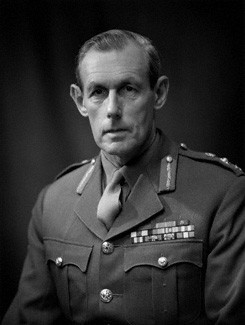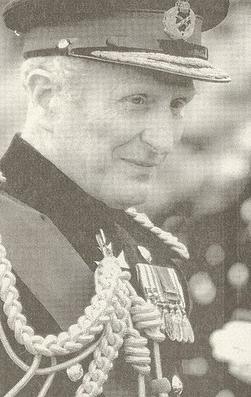Related Research Articles

Field Marshal Richard Michael Power Carver, Baron Carver, was a senior British Army officer. Lord Carver served as the Chief of the General Staff (CGS), the professional head of the British Army, and then as the Chief of the Defence Staff (CDS), the professional head of the British Armed Forces. He served with distinction during the Second World War and organised the administration of British forces deployed in response to the Mau Mau Uprising in Kenya and later in his career provided advice to the British government on the response to the early stages of The Troubles in Northern Ireland.

Field Marshal Sir Nigel Thomas Bagnall, was Chief of the General Staff (CGS), the professional head of the British Army, from 1985 to 1988. Early in his military career he saw action during the Palestine Emergency, the Malayan Emergency, the Cyprus Emergency and the Indonesia–Malaysia confrontation, and later in his career he provided advice to the British Government on the future role of Britain's nuclear weapons.
General Sir Roger Neil Wheeler, is a retired British Army officer who served as Chief of the General Staff from 1997 to 2000. During his career he was involved in the Cyprus Emergency, directed military operations in Northern Ireland and led the UK's forces deployed on NATO operations in Bosnia. He is now a non-executive director of several businesses operating on an international basis.

Field Marshal Sir Archibald Armar Montgomery-Massingberd,, known as Archibald Armar Montgomery until October 1926, was a senior British Army officer who served as Chief of the Imperial General Staff (CIGS) from 1933 to 1936. He served in the Second Boer War and in the First World War, and later was the driving force behind the formation of a permanent "Mobile Division", the fore-runner of the 1st Armoured Division.

Field Marshal Sir John Wilfred Stanier, was a senior British Army officer who was Chief of the General Staff from 1982 to 1985. He was the first person after the Second World War to become the professional head of the British Army without having seen active service in that war or any subsequent campaign.
Major General Sir Douglas Anthony Kendrew,, often known as Joe Kendrew especially during his rugby career, was an officer of the British Army who served in the Second World War and the Korean War, an international rugby player, and the 22nd Governor of Western Australia from 1963 to 1974.

Field Marshal Sir Richard Amyatt Hull, was a senior British Army officer. He was the last Chief of the Imperial General Staff (CIGS), holding the post from 1961 to 1964, and the first Chief of the General Staff (CGS), holding that post until 1965, and, as such, was the professional head of the British Army. He later became Chief of the Defence Staff (CDS) from 1965 to 1967, the professional head of the entire British Armed Forces. He served with distinction during the Second World War, fighting from 1942 to 1945 in North Africa, Italy and Western Europe, became the youngest divisional commander in the British Army, and, after the war was over, he advised the British government on the response to the Indonesia–Malaysia confrontation in the 1960s.

Marshal of the Royal Air Force Sir John Grandy, was a senior officer in the Royal Air Force. He was the only officer who fought and commanded a squadron during the Battle of Britain to reach the post of Chief of the Air Staff. In the latter role he implemented the final stages of the RAF's withdrawal from the Persian Gulf and the Far East, oversaw the ordering and subsequent cancellation of the F-111 strike aircraft and handed over Britain's nuclear deterrent role to the Royal Navy.

General Sir Alfred Dudley Ward,, commonly known as Sir Dudley Ward, was a senior British Army officer who saw distinguished active service during the Second World War and later became Governor of Gibraltar. Serving as an ordinary soldier for three years before being sent for officer training in 1926, slow peacetime career progression saw Ward achieving the rank of captain only in 1937. However, the Second World War, which began just two years later, allowed him to demonstrate his high ability as both a staff officer and a commander of troops in the field. Receiving command of the 4th Infantry Division at the unusually young age of 39 years and 3 months old, he led the division in Italy and Greece from 1944 to 1945. After the war ended in 1945, Ward went on to hold several staff and field appointments at the highest levels, including Deputy Chief of the Imperial General Staff (DCIGS) and Commander-in-Chief of the British Army of the Rhine, retiring as a full general in 1965.
Brigadier James Whitehead CB CMG CBE DSO OStJ ADC was a British Indian Army officer who later became a senior officer in the London Metropolitan Police.
Major-General Sir James Arthur "Jack" d'Avigdor-Goldsmid, 3rd Baronet, was a British Army officer and British Conservative politician. He was a member of the prominent Anglo-Jewish d'Avigdor-Goldsmid family, and his brother Sir Henry d'Avigdor-Goldsmid, 2nd Baronet was also a Member of Parliament.
Major General William Alfred Dimoline, was a senior British Army officer who saw service during the First and Second World Wars. His nickname was "Dimmy."

General Sir William Godfrey Fothergill Jackson, was a British Army officer, military historian, author and Governor of Gibraltar.
Major General Sir Rohan Delacombe, was a senior British Army officer. He was the last British Governor of Victoria, Australia from 1963 to 1974.

General Sir Geoffrey Richard Desmond Fitzpatrick, was a senior British Army officer who served as commander of the British Army of the Rhine and Deputy Supreme Allied Commander Europe. After his retirement from the army he was appointed Lieutenant Governor of Jersey and later held a ceremonial position in the Royal Household.
General Sir Thomas Cecil Hook Pearson, was a senior officer of the British Army who served as Commander-in-Chief of Allied Forces Northern Europe from 1972 to 1974. At the time of his death, he was the oldest living British full general.
General Sir Richard Erskine Ward, was a British Army officer who served in the Second World War with distinction and later became Commander of British Forces in Hong Kong.
General Sir John Francis Stanhope Duke Coleridge was a senior British Indian Army officer who went on to be Military Secretary to the India Office.
Raymond Briggs was a senior British Army officer who fought in both the First and the Second World Wars. During the latter he led the 1st Armoured Division at the Second Battle of El Alamein in late 1942, and throughout the subsequent Tunisian campaign.
Major-General Marshall St John Oswald was a British Army officer who served as Director of Military Intelligence.
References
- ↑ "No. 34364". The London Gazette . 29 January 1937. p. 622.
- ↑ "No. 35316". The London Gazette (Supplement). 17 October 1941. p. 6085.
- ↑ "Army Commands" (PDF). Retrieved 4 June 2020.
- ↑ "No. 42231". The London Gazette (Supplement). 27 December 1960. p. 8894.
- ↑ "No. 43667". The London Gazette (Supplement). 4 June 1965. p. 5473.